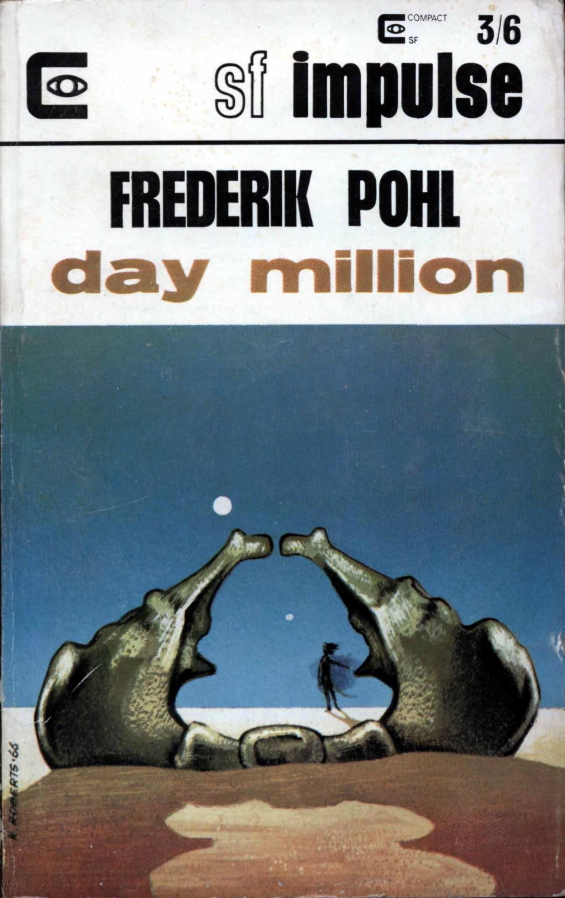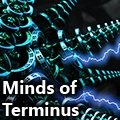
 The SFFaudio Podcast #559 – Jesse, Marissa VU, and Terence Blake talk about Day Million by Frederik Pohl.
The SFFaudio Podcast #559 – Jesse, Marissa VU, and Terence Blake talk about Day Million by Frederik Pohl.
Talked about on today’s show:
a panel on the New Wave, reading the New Wave, stuck in Jesse’s craw, against movements, cyberpunk, that one William Gibson book, steampunk, as it was happening, H.L. Gold, Galaxy Magazine, John W. Campbell, Analog, not that, Philip K. Dick, Alfred Bester, the label science fiction or fantasy, a reaction, quite impressed, really casual, the way it is written, the plot is pathetic, so meta, SF Impulse, mathematically wrong, 10,000 years from now, 1,000 years, the year 3,000, he’s describing 2019 or 1966, he met a girl and took her phone number, copyright 1966 by Rogue Magazine, a sub-Playboy, all the meta-stuff, just I guy who likes boobs, the whole thing is about sex, a direct injection of ideas, a little red convertible, how angrily you recoil from the page, who wants to read about a pair of queers, so innovative, transgender folks that are pronouns that aren’t male or female, the 1980s, born in 1919, sums up all of the issues we won’t care about, just getting used to the idea, 2012 review, what makes it feel old and dated, dude-bro, the dude-bros are back, the dude-bro phenomenon, click around on YouTube, all sorts of people, anti-gay sentiment from totally gay, women are all about peace, Margaret Thatcher, Hillary Clinton, Dick Cheney’s daughter, this dude whose reading a girlie magazine, interviews with Arnold Schwarzenegger in 1981, trending, a phenomenon, the last hurrah, the narrator is criticizing you, everytime there’s an objection, on this way I want to tell you about, a boy a girl and a love-story, none of it is true, undercuts, 137 years old, not a girl, the urge to rape and the urge to submit, psychology, a pedagogical lesson in what SF is, poignant sentiment, it sounds sarcastic and full of cliches, beginning with a hyperbole, just before the singularity, present day concerns, silly requirements long since left behind, the end, Spider Robinson’s podcast on this story, permission to read, what very well may be the ultimate science fiction short story, a lot of competition, edging out a lot of the competitors, more interesting, an introduction to science fiction, Robert Silverberg’s Science Fiction 101, a terrible story
And you—with your aftershave lotion and your little red car, pushing papers across a desk all day and chasing tail all night—tell me, just how the hell do you think you would look to Tiglath-Pileser, say, or Attila the Hun?
boom, he dropped the mic, and walked away saying “I just showed you what science fiction is, yo.”, whisky, shaving everyday, everybody’s all beardy, ride horses and subdue cities, a man sits behind a desk, he bbqs stakes in the back yard, that is fucking weird, some of it is preposterous, the most normal stuff, VR stuff, personality copying, prosthetics, cavities filled, rude parts removed, organs, a new wave retelling of Scanners Live In Vain, Pohl fell in love with Cordwainer Smith, stacking up the famous science fiction writers, eventually you would get to Pohl, he was there the whole time, the opposite of Campbell’s movement, writing and editing magazines, he didn’t do the Moon Landing, with Cyril Kornbluth he wrote The Space Merchants, the Senator from Proctor And Gable, a book for millennials, sleeping on the stairs, near death of capitalism, a near singularity story, Don and his voyages, circled Alpha Centuri, agricultural implements, 10,000 planets, but you don’t care about that either, its people who make stories, making a concession, science fiction has no real characters or character development, full of circumstances, he’s mocking the reader, double meta reverse irony, you think I’m crazy, that part is boring, it doesn’t deliver what the readers want, oh my god, he’s right!, you don’t understand your place, there just different, offhand comments, you might be thinking about, they didn’t care, Dora is a dancer, the audience doesn’t care, you can’t make babies with her, that’s not natural, he responds to every dude-bro idea, “No”, I still don’t like it, Jesse’s two personalities, natural is good bullshit, everything is difference and everything is change, the smell of peanut butter, that she’s got a pelt, lives under the sea, gills, zero-g dancer, capable of deploying more energy that Portugal in a year, she doesnt sweat in the normal way, she’s up to peanut butter, musky honey, she’s more like a beaver or an otter, a platypus, he’s cranching all the time, getting his legs renewed, only the brain feels, the top tier of the middle class, the ads, an MG roadster, tennis rackets, cigars, cars, turtlenecks, a men’s fashion magazine, even the title, he gets about, a naughty wink wink, an aspirational lifestyle magazine, a tame rascal, Dude, Where’s My Car?, The Hangover, hipsters WWII veterans, the many many anthology, Worlds Of Wonder, not for an audience that’s familiar with SF, for the thinking man who has boobs, the cover illustration for SF Impulse, a human female near the horizon, are you guys seeing what I’m seeing, those calypgean hips = nice ass, she has a tail, not literally childbearing, Podkayne Of Mars by Robert A. Heinlein, conceived earlier and decanted later, birthing technology, plausibility, you can’t gill people up anytime soon, beyond the singularity for Jesse, birth control pills changed things a real fuckton, PROFOUND EFFECTS upon everything, thinking about science fiction as NOT about rocketships going to planets, incredibly valuable, its not supposed to be hard SF, an interesting shift, we could have sex for fun, how is this going to go, Robert Silverberg’s Dying Inside, a mid-life crisis book, lets dwell with this idea, quite an interesting book, it feels like mainstream fiction, what effect would that have?, he can do whatever he wants, like a crutch…, there’s one person who had a cellphone that’s connected to the internet we have but his battery is getting weaker and weaker, you don’t know how to fix it, imagine you had that superpower for 40 years, and that’s science fiction, everything you know that you think is normal I’m cutting away, all the ground falls out from under you, more Buck Rogery style of story, nobody was writing it at that time, but it was translating into film, once you need Day Million in 1985…, a secret sin, science fiction as the literature of cognitive estrangement, it is but not what you expect, the tears and poignant sentiment, it made her feel sad, intensity of emotion, just their memories of each other, they’re not really human anymore, maybe dying earth, the death of humanity, post-human stories, I don’t get you, a couple texting, c u next time, being unable to understand, an ant on Jesse’s kitchen floor doesn’t know what Jesse’s doing in the next room, magnitude, an ant can’t understand a flea, singularities cropping, we’re not supposed to be able to understand, when the curve suddenly changes direction, artificial intelligence, deciding to give up peanut butter, record it for LibriVox, The Men In The Walls by William Tenn, what the people who were talking, Mankind consisted of 128 people, so vast a horde, sometime ago Earth was invaded by aliens, vast their huge their massive, humans as rats in walls of aliens houses, that change of magnitude, not only in time, an incommunicable difference, Virgil Finlay illustrations, dude, podcast, that’s the one, we can do that then, Of Men And Monsters, even if you’re the only thing in the universe, copies copulating with other copies, they need to meet each other, they met at the encoding room and they blushed, do they have to do it to tape it, making a digital copy of themselves, kids today, looking at their phones lovingly, all that sensory detail with them, they have friends too, passion of kiss in symbolic mathematical form, a residue of flesh or body, supercomputer tinder, when they lived in Seattle with a bunch of friends and dating with OK Cupid, a traditional Hollywood Meet Cute, oh shit vs oh hell, the exhibition has an open fly, balls you say vs rats you say, everything is virtual, dose of fleshiness, masterfully put together, Jesse feels to privileged, that wasn’t universally true, a story from Weird Tales called Pity Me! by Bertha Russell, in 1928, an old man who gets his jollies from having sex with dead bodies, she came back to life, how could this be?, this does not fit, 1920s flappers, great grandma and great grandpa were swingers, “problematic”, losing their jobs, they published that?, have you met a 15 year old, no matter where you go you find humans in time, comforting, they’re just like us but their circumstances are different, that big gap, what the publishing industry is putting out, whatever I’ve been reading recently will inform the plots, whatever you put in you’ll get out, if you only prime yourself science fiction novels you’ll get science fiction novels, read widely, watching science fiction TV and want to write a novel, new drafts coming in, the camera is panning in around things, a new phenomenon too, comics that are written as adaptation to Netflix, the art’s good, designed to be adapted as a Netflix series, what’s new this week, so many show there is no way to keep track, you could never catch up, feeding that hunger mill, all the competition for Netflix is starting this month and next and next year [2020], 40 other shows to buy that day, sometimes that works, give me your most innovative story, he was editor of Galaxy and If: Worlds On Science Fiction, playing to the market, being terrible, they say Netflix on the side, a mill aspect, what the reaction of the New Wave is against, Algis Budrys, regular science fiction of the 30s and 40s and 50s, a monetary currency that had been debased, a bunch of tropes that were all worn out, telepathy, Ray Bradbury would use that same vocabulary and do his own thing with it, Heinleinian style Asimovian stlye, more internal, one human being failing, taking drugs on a ship, Charles Stross, a human observer, Ted Chiang, hermeneutics,
Martel was angry. He did not even adjust his blood away from anger. He stamped across the room by judgment, not by sight. When he saw the table hit the floor, and could tell by the expression on Luci’s face that the table must have made a loud crash, he looked down to see if his leg were broken. It was not. Scanner to the core, he had to scan himself. The action was reflex and automatic. The inventory included his legs, abdomen, Chestbox of instruments, hands, arms, face and back with the Mirror. Only then did Martel go back to being angry. He talked with his voice, even though he knew that his wife hated its blare and preferred to have him write.
“I tell you, I must cranch. I have to cranch. It’s my worry, isn’t it?”
When Luci answered, he saw only a part of her words as he read her lips: “Darling … you’re my husband … right to love you … dangerous … do it … dangerous … wait ….”
He faced her, but put sound in his voice, letting the blare hurt her again: “I tell you, I’m going to cranch.”
set in the same universe, the 1950s housewife, the other Cordwainer Smith story, The Lady Who Sailed The Soul, explain a photograph to a neanderthal, our way of seeing telepathy, we know what they’re thinking, accessible to the inner eye, a perfect reproduction, captures a moment, what difference does it make, everything is fantasy, everything out in the world is projection, fighting in a Battle Royale for a Chicken Dinner, romantic relationships can be…, the encoding room, their friends were there to cheer them on, are the friends physically there?, he’s a star man, on Wednesday, he takes all his friends with him, like Yoda and Obi Wan Kenobi?, over there there’s Ben Kenobi, how much is virtual is ambiguous, I saw you on the bus you dropped your glasses, are you looking for me?, never lose those interactions, your ex-wife never becomes your ex-wife, and husbanded, the only thing we’re almost sure of, totally programmed world, atoms all fall down, all the rest could be 100% virtual, sometimes the requirements of the human need for storytelling requires a certain page count, two sentence long story, what day is it?, Day Million, that’s not the way we count, tweaking his audience’s nose, his tongue is firmly planted, these things are coming faster, in your lifetime, the sexy version is “Night Million”, how many words, wordcounter.net, all these things we couldn’t do before except by hand, 2,122 words, 2,500 words, a very cynical view of relationships, that dating farce, the instinct to submit, kinda crass, no chasing, too animal, it really changes things for women, the Vanderbilt on CNN (Anderson Cooper), he comes from billionaire stock, billionaire DNA, gay bath houses and sex sex sex, a very straight gay man, “c’mon man”, the BC Civil Liberties Association, always suing the border customs guys, somebody at the border, philosophy of law, the gay bathhouse phenomenon in Toronto, homosexual men don’t have to worry about babies, as much sex as they want, imagine if women if women don’t need to have babies, as many husbands as they want, it does change the female psychology, females are scarce, get the equipment or marry somebody, it really changes things, you all have to start acting like gay men, the numbers of transitioners, more modest?, more randy?, gay bathouse men from the 1970s, men now living in a woman’s world, modifying their behavior, how people are externally treating them, the whole phenomenon of Saudi Arabia, women in the middle ages in Europe, we gotta keep that all locked down, the whole chastity belt, you can do a lot without electricity,



Posted by Jesse Willis






